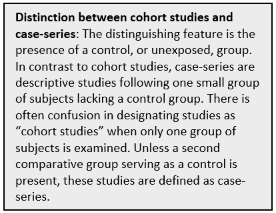Completion requirements
View
1. Types of Descriptive Studies
1.1. Case Reports and Case Series
These are descriptive studies of one (case study or case report) or a series of patients (case series) defined by eligibility criteria, and where the unfolding course of events (disease progression, therapies, outcomes, etc.) is described in detail and where interventions are not manipulated. This study design is used to provide a detailed description of an uncommon disease or condition, a specific situation, or unique therapeutic approaches. Reports provide retrospective safety and efficacy details, as well as other clinical parameters (e.g., quality of life [QoL]) derived from cases of interest in their natural clinical setting.

A
case series describes the person, place, and time information about a group of
cases. It can be retrospective, looking back in time, or prospective, looking
forward in time, and usually involves a small number of patients. Case reports
and series permit discovery of new diseases, unexpected effects, and provide
data for generating hypotheses although the generalisability of their findings
is limited because of selection bias and lack of controls. Data from a case
series may be used in analytic studies to investigate possible causal factors.